
by Center for Mentoring Excellence | Aug 11, 2016 | Facilitating Learning, Goal Setting Conversation, Growth and Development, Making Mentoring Work For You, Mentoring Questions, Mentoring Relationships
One of the biggest parts of mentoring? Asking questions! But when should you ask questions? And when the time is right, what should you ask? Here’s a handy list of questions you should be asking your mentee over the course of your mentoring relationship:
For starting the mentoring relationship:
- How do we make this process work for you?
- What are your expectations?
- What would you recommend we do to make this work?
- What are you willing to commit to?
For goal setting:
- What is the most important thing you want to achieve?
- What can I do to help you with your leadership development?
- What is your strongest attribute?
- Where do you see your challenges?
- What would help raise your confidence level?
For pushing and challenging your mentee:
- Is this goal worthy of our time and effort together?
- What might be a challenging project for you to undertake?
- What would it be like to step out of your comfort zone?
- How is this goal going to contribute to your development?
- Did you think you are putting in sufficient effort to accomplish results?
- Why do you think there is only one solution? What else might you try?
- If you were grading your results, what grade would you give yourself?
For goal achievement:
- Did you get the results you hoped for?
- How would you approach this situation?
- Where else can you apply that?
- What is your team looking for from you?
- Is your supervisor seeing a difference?
- How else might you tackle that?
For checking in and feedback:
- What value has this provided for you thus far?
- What can we do differently to improve this relationship?
- Are we on the right path?
- What feedback have you received?
- How do you know you are making an impact?
- How can we make this work for both of us?
- How do you think you are doing?
- Are you satisfied with your results?
- Are you putting in the effort you feel you should?
- You’re quiet … what are you thinking?
- Whose feedback would be a benefit to you?
Ready to get started? Let us know how these questions help improve your mentoring relationships.
(Photo via Flickr CC: Colin_K)

by Center for Mentoring Excellence | Aug 2, 2016 | Facilitating Learning, Making Mentoring Work For You, Mentoring Relationships
So, you’ve decided that you want to start a mentoring relationship. But now what? You need to find a mentor. That might be easier said that done, however. Finding a mentor that’s a good fit for you is an important part of the mentoring process, one that is worth the effort and the time.
And it’s about more than just finding someone you like. You need to be intentional about finding a mentor, and you must consider more than personality — consider learning styles and communication styles.
Here are some things to consider as you begin your search:
- It starts with you — What are you looking to learn? What attributes are you looking for in a mentor? Knowledge, expertise, experience (or all of the above)?
- Identify your “must haves” — What do you need to have in a mentoring relationship? Make a list!
- Use your network like crazy — Tell people what you’re looking for. You never know who they might be able to introduce you to! Meet people, get contact information, research names, find out what you can. Your network is a great tool when looking for the ideal mentor.
- Go back to your list — Once you’ve collected a list of possible mentors, figure out who meets your criteria (and who doesn’t) and begin to select the ones you’d like to reach out to.
Some do’s and don’ts:
- Don’t:
- Pick someone who will be too easy on you
- Select someone just because they like you
- Choose someone because they are the most convenient
- Opt for someone because you already have a relationship
- Choose someone you report to directly
- Do:
- Seek a good learning fit between what you need and what this person has to share
- Find out if this person has sufficient time to mentor you
- Ask yourself if this person will challenge and encourage you to constantly raise the bar for yourself
- Consider if this person appears to be a good listener, has a sincere desire and willingness to mentor, and the knowledge and expertise you need.
Now the fun part: Meet them! Make sure to set up time to get to know your potential mentors, and see if they fit your mentoring criteria. Once you meet them you’ll quickly be able to tell if they are the right one for you.
(Photo via Flickr CC: Mateus Lunardi Dutra)
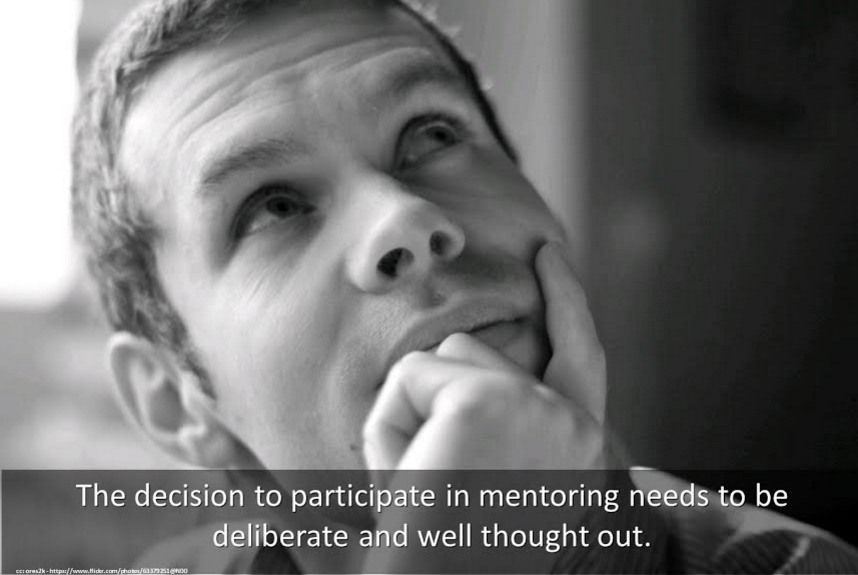
by Center for Mentoring Excellence | Jun 20, 2016 | Facilitating Learning, Making Mentoring Work For You
Your company has just announced a new mentoring initiative that has generated a groundswell of interest and excitement. Your supervisor has signed you up as a mentor and just let you know. Gulp! What am I in for?
You are busier than ever on top priority and high impact projects and you know there are three more waiting for you once those are completed. Additional responsibilities in your role are stressing you out.
Now you have been “voluntold” that you must participate in the initiative as a mentor.  Can you say no? How would it look if you didn’t participate? What would your supervisor think? What would it say about your ability to manage your workload?
Can you say no? How would it look if you didn’t participate? What would your supervisor think? What would it say about your ability to manage your workload?
Mentoring participation is a serious commitment. Participating because you’ve been voluntold isn’t a good enough reason to say yes. You have to want to be a mentor. It takes time and effort, and without a serious personal commitment you may well not have the energy and enthusiasm you will need to be successful.
Know that you are not alone. Peer pressure can be bad enough without being voluntold by one’s supervisor.
Here are six questions to consider before making this hard decision:
1. Do I have a sincere desire to engage in a mentoring relationship?
2. Am I willing to do the work required to prepare for mentoring meetings?
3. Do I possess the requisite knowledge, expertise or experience to mentor a mentee?
4. Do I have sufficient time right now to mentor a mentee?
5. Do I feel comfortable being a mentor?
6. What competencies or skills do I possess that would make me a good mentor?
If you can’t do the job that being a good mentor requires, It is best to speak up and say no (even if you have been voluntold).
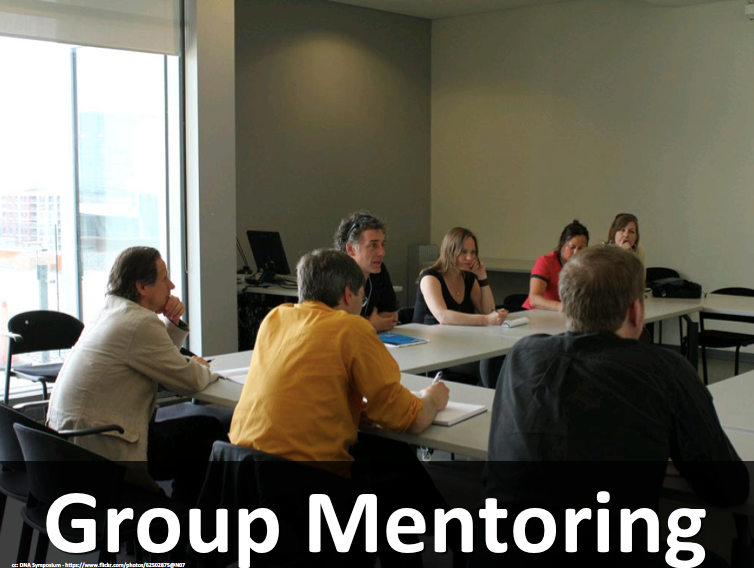
by Center for Mentoring Excellence | May 27, 2016 | Facilitating Learning, Group Mentoring
When we think of mentoring relationships, we usually think of one-on-one interactions with a mentor and a mentee. But that doesn’t always have to be the case. In fact, for many organizations, group mentoring has become an equally effective (and often more efficient) way to offer mentoring services to employees. But what is group mentoring and how does it work? Here are three ways to approach group mentoring.
Team mentoring
This one is pretty self-explanatory. A group of mentors, each with their own unique set of skills and mentoring expertise, work with mentees to give them a well-rounded and multi-faceted mentoring environment.
Note: Make sure team mentors are given the necessary tools and training to make their relationships successful.
Peer mentoring
Again, the name says it all. There’s a lot that can be learned from our fellow mentees; allowing mentees to, in turn, mentor their peers is a powerful way to reinforce mentoring practices and instill leadership qualities beyond traditional mentoring settings.
Note: Goal-setting and self-direction are key. It also helps if peer mentors have similar roles, experiences and interests.
Facilitated group mentoring
What if your mentoring journey was influenced by those seeking mentoring services just like you? Chances are, you’d be exposed to new and exciting ways of thinking. That’s the idea behind facilitated group mentoring. While you still work with a traditional mentor figure, your fellow mentees will help set agendas, group goals and influence your experience in ways you wouldn’t have otherwise been able to predict.
Note: Make sure every member of the group has a specific role and responsibility; this ensures people don’t feel left out or unheard. It also helps to limit mentoring groups to eight people or less.
So, what do you think? Is group mentoring for you? Have you tried it in the past? Let us know.
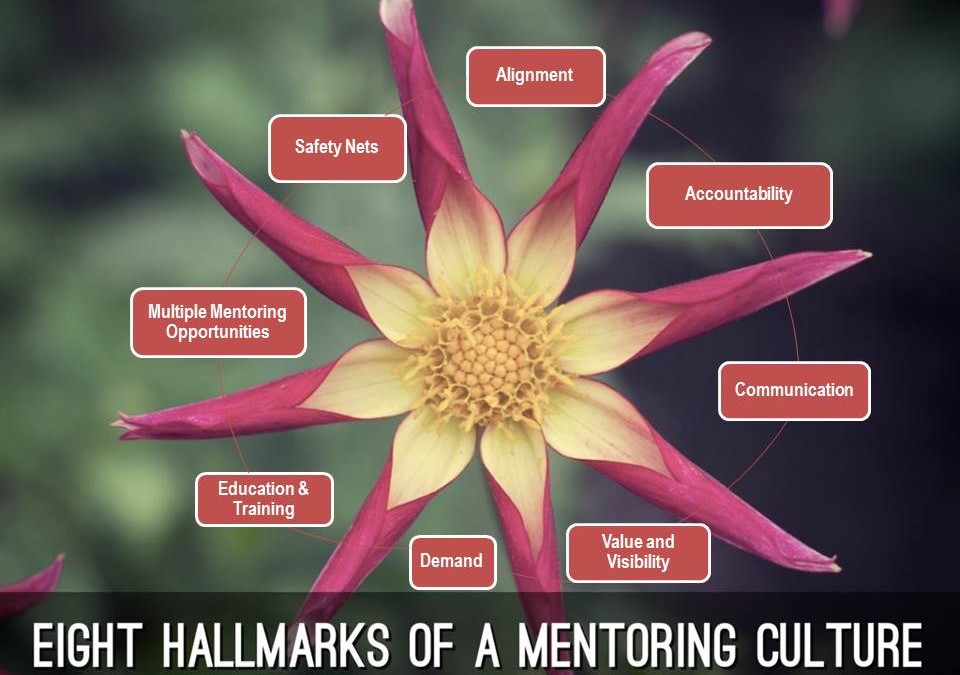
by Center for Mentoring Excellence | May 18, 2016 | Mentoring Training
Mentoring at “Ideal Organization” (IO) grew out of a formal program for high potentials. The initial program created such a buzz throughout IO that now, ten years later, its participants are still committed to mentoring others and initiating mentoring opportunities in their own organizations. Several years ago an organizational survey revealed that in addition to one-on-one informal mentoring and formal mentoring programs, multiple groups actively engaged in mentoring (i.e., women’s executive mentoring, technical mentoring, and cross-functional mentoring). Leaders regard mentoring as part of their responsibility to informally mentor employees who show promise. Those charged with managing, supporting and coordinating mentoring efforts at IO monitor progress, measure results and work with teams throughout the organization to integrate mentoring process improvements. In addition, they keep an internal focus on mentoring. They coordinate mentoring efforts to make sure that all mentoring programs align with one another other and with the organization’s culture.
Mentoring at IO is always in motion and constantly creating learning bridges that empower individuals to transform Ideal so that it continues to live up to its name. The leaders at IO worked through a number of steps and phases in developing its mentoring culture. It’s still a work in progress.
Sounds great, yes?
Is your organization committed to making an ongoing investment in mentoring? If you’re serious about mentoring and are committed for the long haul, read on.
A mentoring culture creates a continuum of expectation about mentoring and establishes a standard of excellence for mentoring practice. It also encourages mentoring excellence by continuously creating readiness for mentoring within the organization, facilitating multiple mentoring opportunities, and building in support mechanisms and safety nets to ensure individual and organizational mentoring success.
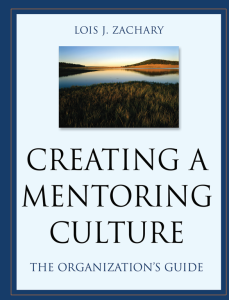 What’s more, it:
What’s more, it:
- Establishes ownership for mentoring within the organization
- Promotes shared responsibility
- Maximizes resources
- Maintains integrity
- Facilitates knowledge utilization
- Supports integration of key processes into the organization
- Creates openness to learning through mentoring
- Shortens ramp up time
What are you waiting for? To learn more, purchase your copy of Creating a Mentoring Culture today. It will guide you through each of the eight hallmarks that contribute to creating a vibrant and full mentoring culture.

by Center for Mentoring Excellence | Apr 14, 2016 | Growth and Development, Making Mentoring Work For You, Mentoring Communication, Mentoring Questions, Mentoring Relationships
Chemistry. Compatibility. While these traits are crucial to a successful mentoring relationship, there’s so much more involved, most importantly — you. What do you want to learn? Who do you want to learn it from? Recruiting a mentor can seem like a daunting task, but being thorough and prepared when making the ask leads to success.
How to Prepare
Have a conversation with yourself:
- Identify what it is you need to learn.
- Think about what you need from a mentor.
- Consider how much time you can contribute to a mentoring relationship. Look yourself in the mirror and honestly consider if you have the time, willingness and commitment to mentoring.
- Think about your prior mentoring experiences and how you can actively contribute to the success of your relationship.
Ask yourself some important questions:
- Am I sincerely interested in learning?
- Am I willing to commit time to developing and maintaining a mentoring relationship?
- Am I willing to be open and honest with myself and another person?
- Can I participate without aversely affecting my other responsibilities?
Making the Ask
You can do all the preparation in the world, but if you aren’t able to communicate your needs and ask a potential mentor for their time and energy in an inviting and honest way, you may lose out on a great mentoring opportunity.
Make sure to clearly communicate:
- What you want to learn.
- Why you want to learn it.
- Why you think this person is a good match for you.
- What you need from the relationship.
- What you are willing to contribute.
Make sure to present yourself as:
- Competent
- Committed
- Compatible
- Conscientious
- Ready to Learn
- Accountable
With the right preparation, the right communication and the right presentation, you’ll be able to set yourself up for success when asking a potential mentor for their help.
How have you sought out mentors? What worked and didn’t work for you?

by Center for Mentoring Excellence | Mar 21, 2016 | Goal Setting Conversation, Growth and Development, Mentoring Relationships, Supporting Mentors and Mentees
The Importance of the First 90 Days
It’s a fact: The first 90 days sets the tone for your mentoring relationships! According to Lory Fischler, co-author of Starting Strong (Jossey-Bass 2014), “Many mentoring relationships don’t actually survive the three-month milestone. That’s because they start with good intention and energy but get derailed by lack of time, structure, purpose, progress and accountability.”
We’ve identified six essential conversations that we believe ought to take place during the first 90 days of a mentoring relationship to ensure that it starts strong and stays focused. These conversations set the tone for mentoring success.
Conversation #1: Mentoring partners often jump into mentoring too soon and fail to take the necessary time to get to know one another. When mentoring partners spend time to build their relationship by engaging in real conversation, they are better able to establish the high level of trust that is critical for learning and growth.
Conversation #2: Once trust has been established, it is time to decide how to structure your mentoring relationship and your meetings so that you stay on track. By proactively talking about ground rules, confidentiality, hot buttons and boundaries, mentoring partners avoid problems along the way.
Conversation #3: A robust series of conversations about the mentee’s goals is often more important than the process of formally defining them. Through conversation an effective mentor facilitates mentee understanding about his or her needs and the areas of potential growth necessary to meet those goals.
Conversation #4: Once goals have been identified, it’s time to talk about how to achieve them. This is accomplished by identifying learning opportunities to support and challenge the mentee — to encourage a mentee to stretch and stand outside his or her comfort zone. This where true growth and development occur.
Conversation #5: Along the way, there may be stumbling blocks that get in the way of the relationship. Holding a conversation to address them as soon as they occur keeps the focus on progress and forward movement.
Conversation #6: The three-month milestone is ideal for holding a two-way feedback check-in conversation. By addressing meaty questions (i.e., “What has been the biggest learning to date? What are we doing that is providing value? What is working and what could be better?”) both mentor and mentee receive feedback that enables them to elevate their individual skills.
You won’t want to miss our day-long conference, Making Mentoring Matter: Strategies and Tools for Individual Development and Organizational Effectiveness on Wednesday. May 4, 2016 in Bellevue, WA., where Lory Fischler will be presenting a workshop entitled “Starting Strong: The First 90 Days.”
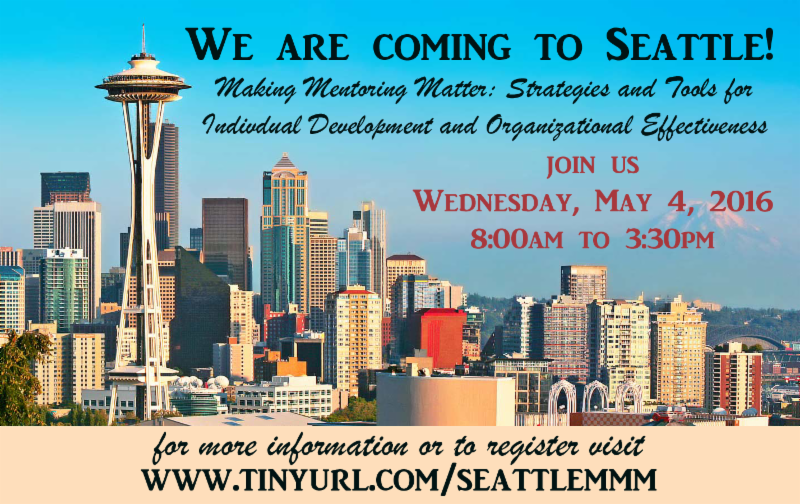
by Center for Mentoring Excellence | Mar 15, 2016 | Mentoring Training
Mentoring has become a business imperative and a corporate responsibility. (more…)

by Center for Mentoring Excellence | Mar 2, 2016 | Making Mentoring Work For You, Mentoring Relationships, Uncategorized
The idea of inserting accountability into a mentoring relationship may seem unnecessary. And yet, unless you build in a process to ensure accountability, there is always a temptation to sidestep it.
When mutual accountability becomes an ongoing expectation in a mentoring relationship it creates a shared frame of reference. It strengthens the relationship by improving communication and avoiding mentoring pitfalls. It enables partners to make midcourse corrections.
When mentoring partners engage in regular conversations about their mentoring relationship, it maintains the momentum of the relationship and contributes value to the learning of each mentoring partner.
Accountability conversations need not be cumbersome, but they should be held regularly, whether it is once a month or every quarter. If your relationship seems to be going well, checking in on its health will help ensure that you and your mentoring partner’s need are being met. At the same time, accountability conversations can assist you in gauging your progress over time and help you decide what you steps you can take to grow and improve your relationship.
We’ve developed a Mentoring Partner Check-In Accountability Tool to guide regular accountability conversations.You and your mentoring partner can complete this tool independently and then compare your responses. Or, you and your mentoring partner can complete this tool together.
You and your mentor should plan to use this tool periodically to ensure that you are staying on track. And, even if you haven’t agreed to do so initially, feel free to introduce this tool to your mentor partner at any time during your mentoring relationship. This may prove especially helpful if you suspect that your meeting time could be better utilized and you aren’t comfortable raising the issue with your mentor.
Use the Mentoring Partnership Check-In Accountability Tool throughout your relationship to make sure you stay on track and the trust level remains high.

by Center for Mentoring Excellence | Feb 18, 2016 | Mentoring Relationships, Uncategorized
In the spirit of Valentine’s Day, here’s our mentoring ten top list for the month of February.
#10 Revisit, refine and recommit to your development goals.
#9 Check in with your mentoring partner to evaluate progress.
#8 Pay attention to both what is said and what is not said.
#7 Balance care and compassion when giving hard feedback.
#6 Keep an open mind when receiving feedback.
#5 Challenge your mentee with a stretch project or assignment.
#4 Explore areas of diversity and difference.
#3 Listen twice as much as you speak.
#2 Ask probing questions rather than giving answers.
#1 Get out of your comfort zone and try something new.




 Can you say no? How would it look if you didn’t participate? What would your supervisor think? What would it say about your ability to manage your workload?
Can you say no? How would it look if you didn’t participate? What would your supervisor think? What would it say about your ability to manage your workload?

 What’s more, it:
What’s more, it:







